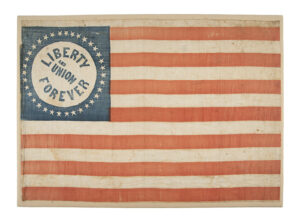The Election of 1864

Here’s more of the story. Hello, I’m Susannah Koerber, Chief Curator and Research Officer of the Indiana State Museum and Historic Sites talking about the election of 1864. When Lincoln was up for reelection in 1864, it might have seemed obvious that a president during a time of war would be reelected. But his election was far from certain. He was not very popular in part because of the Emancipation Proclamation, and the war was not going well. Lincoln had pushed for emancipation, including passage of the 13th Amendment ending slavery, to be part of his party’s platform. And during the campaign season, he issued a statement making it clear that the end of slavery would be a condition of Southern surrender. These brought even more public opposition to his candidacy. At the same time, he was trying to balance between conservative and radical wings of his party. The conservative members of the party were not as enamored of emancipation, and thought it might lose them the election. While the radical wing thought that Lincoln did not go fast or far enough. With multiple possible candidates in the wings, it looked like he might not even be nominated. The Democrats chose George McClellan, a general whom Lincoln had removed as their candidate. Their platform was against emancipation and equal rights for Blacks, and for a quick end to the war, saying, “That is the sense of the American people that after four years of failure to restore the Union by the experiment of war, the public welfare demands that immediate efforts be made for a cessation of hostilities with a view to an ultimate convention of the states.” While their candidate, as a former general, waffled on how quickly he would end the war, both he and his vice president were adamantly against emancipation. During the summer of 1864, Lincoln was so concerned that he would lose the election, that he came to a Cabinet meeting with a folded piece of paper that he asked all of his Cabinet members to sign without reading. We now know this is the blind memo. Dated August 23, it says, This morning, as for some days past, it seems exceedingly probable that this Administration will not be re-elected. Then it will be my duty to so co-operate with the President elect, as to save the Union between the election and the inauguration; as he will have secured his election on such ground that he can not possibly save it afterwards. Lincoln knew that if McClellan won, and the war was brought to a conclusion without ending slavery and without addressing the issues that had caused the war in the first place, the Union would not be sustainable. As it happened, Lincoln did not need to worry. Military victories, starting with Sherman’s capture of Atlanta in early September, meant that the war started going much better for the Union. The conservative and radical wings of his party united behind him, seeing what a disaster general McClellan would be for the country. And in the end, Lincoln won the election by a landslide.








